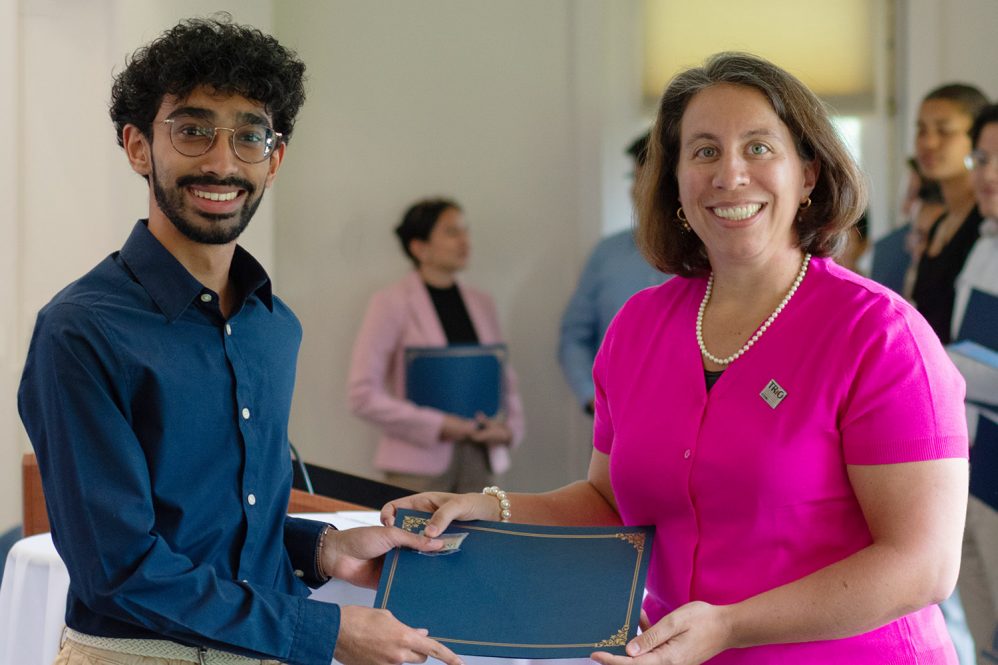By Olivia Drake, Written Communications Specialist
Like many ambitious kindergarteners, Jose Cevallos Jr. ’24 aspired to be an astronaut when he grew up.
“I remember being fascinated by the idea that there are people that work and even live in space for periods of time,” he said.
Now a senior at the University of Connecticut, he hasn’t let go of that dream.
“One day I hope to be one of the very few candidates to participate in NASA’s Astronaut Training Program and one day go to space,” he said. “I always knew how difficult and competitive it will be, and I’ve had days where I would carry a lot of self-doubt. But to this day, I have not let it get in my way. I am determined to keep going.”
Cevallos, who is pursuing a mechanical engineering concentration within the engineering physics major, is one of 14 UConn students and four engineering majors to be named McNair Scholars. Through the Center for Access and Postsecondary Success (CAPS), the UConn Ronald E. McNair Postbaccalaureate Achievement (McNair Scholars) Program is a U.S. Department of Education TRiO program that equips first-generation and/or minority undergraduate students with tools to succeed at UConn and prepare them to pursue a Ph.D.
Cevallos, along with Manav Surti ’25, biomedical engineering; Jason Pulla ’25, chemical engineering; and Cesar Rodriguez ’24, mechanical engineering, were inducted as McNair Scholars during a ceremony on Sept. 19. The program was led by Tadarrayl Starke, associate vice provost for the Institute for Student Success, and Renee Trueman, director of CAPS Research Scholars and the McNair Postbaccalaureate Achievement Program.
“We are a community-centric program, so the undergraduate students truly get to know each other and lift each other through this demanding and unique pursuit of a Ph.D. degree,” Trueman said. “Our program is multi-year, year-round, with a focus on holistic conversation always.”
THE MCNAIR JOURNEY
McNair Scholars begin their journey with immersion in undergraduate research as part of the UNIV 2100: Preparation for STEM Academic Research course, community engagement events, and peer mentorship each Spring semester. Scholars establish faculty research project mentors who help them blossom into investigators during the academic semesters until they graduate, including a two-month fully funded summer internship component.
In addition, the scholars meet regularly with program staff to discuss life balance with academics and research and the best ways to navigate the graduate school application process step-by-step. At the semester’s end, students are named CAPS Research Scholars or McNair Scholars based on their level of commitment to program objectives and career aspirations.
Year-round, until graduation, scholars participate in professional development workshops; networking opportunities; community engagement activities to build social capital, cultural capital, and financial literacy thorough graduate school preparation, including constructive feedback of application materials; funded discipline-specific conference attendance; funded graduate school visits, and mentorship.
Cevallos, Surti, Pulla, and Rodriguez were four of the student participants of this summer’s cohort. For all of June and July, they focused on research advancement, graduate school visits, professional development, graduate school application creation, and data communication during the program’s annual poster exhibit.
Brief research bios of the students are below:
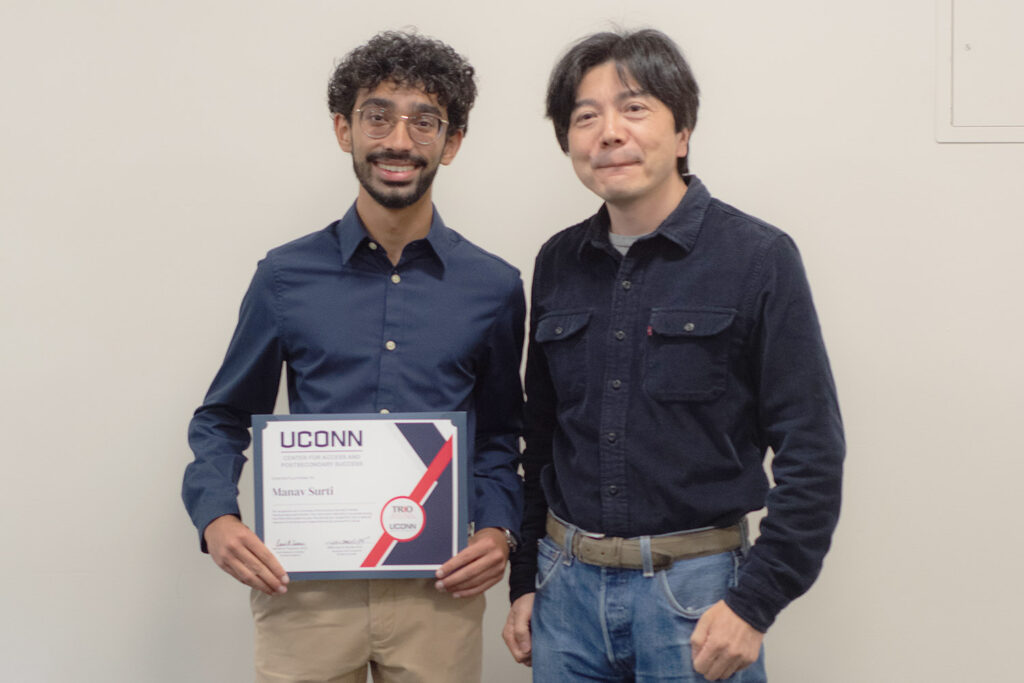
MANAV SURTI ’25
Surti, a first-gen student from South Windsor, Conn. spent the summer working with Associate Professor of Biomedical Engineering Kazunori Hoshino on differentiating organoids undergoing different drug-delivery treatments in terms of their mechanical structure. They collaborate with biologists at UConn Health Center to culture and apply micro-Newtonian forces on the organoids using a biocompatible/piezoelectric compression device.
“This research can help us better understand how cells behave and respond to various stimuli in the human body,” Surti explained. “We’re also employing lightsheet microscopy in this context to give us the advantages of a high spatial resolution, fast acquisition speed, and broad image depth while not damaging our samples.”
Surti’s interest in engineering stems from high school when he took AP biology.
“I wished to combine my interest in math and biology and biomedical engineering was the perfect way to do so. Now being enrolled in BME classes, I know I made the right decision,” he said. “After obtaining my undergraduate degree, I will be applying to grad schools—both Master’s and Ph.D. programs—with the end goal of doing research in the industry.”
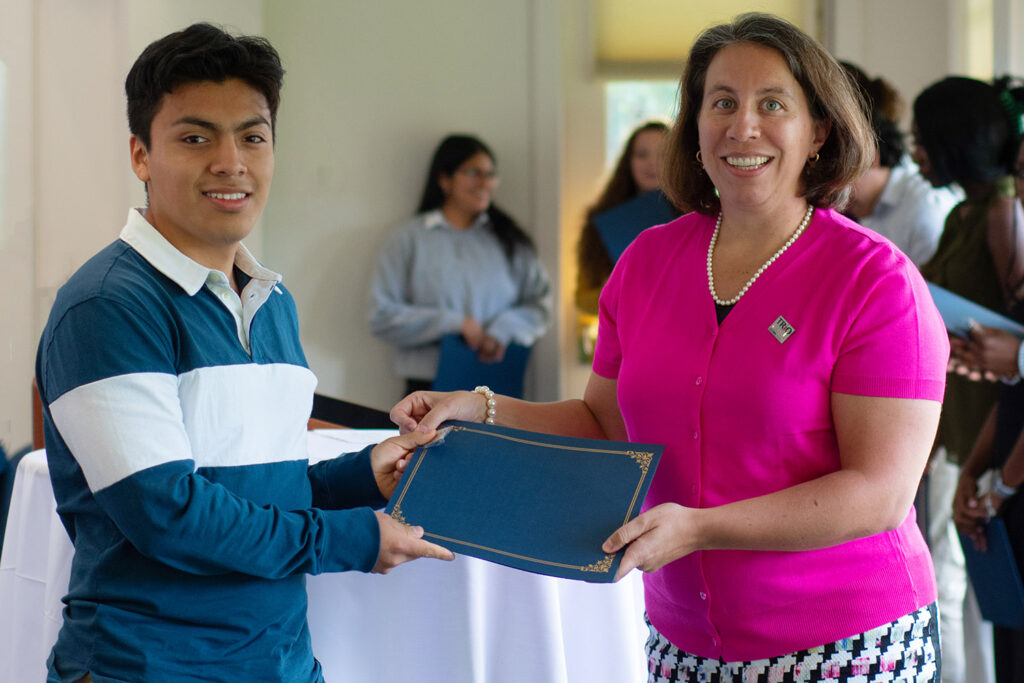
JASON PULLA ’25
Pulla, a first-gen student from Danbury, Conn. chose to major in engineering for three reasons: ample opportunities, the problem– solving aspects, and “I enjoy watching science applications help out the world,” he said.
In his research, Pulla works with Professor of Chemical and Biomolecular Engineering Luyi Sun on a project strengthening “smart” materials, specifically thin film plastics. This research has applications in areas like food wrapping and shoe soles. “I was amazed by the elasticity of the polymer I used—styrene-butadiene—during our tensile strength tests,” he said. “This project deepened my understanding of materials synthesis and improved my experimental and analytical skills.”
Like most McNair Scholars, Pulla has plans to attend graduate school and apply for the Ph.D. program in chemical engineering at UConn. Ultimately, Pulla hopes to work as a research scientist and develop new materials—particularly in energy and environmental science—and explore process engineering and manufacturing.
“I had a valuable experience with the McNair program,” Pulla said. “Now, I am currently thinking about pursuing my graduate degree and developing my knowledge in chemical engineering.”
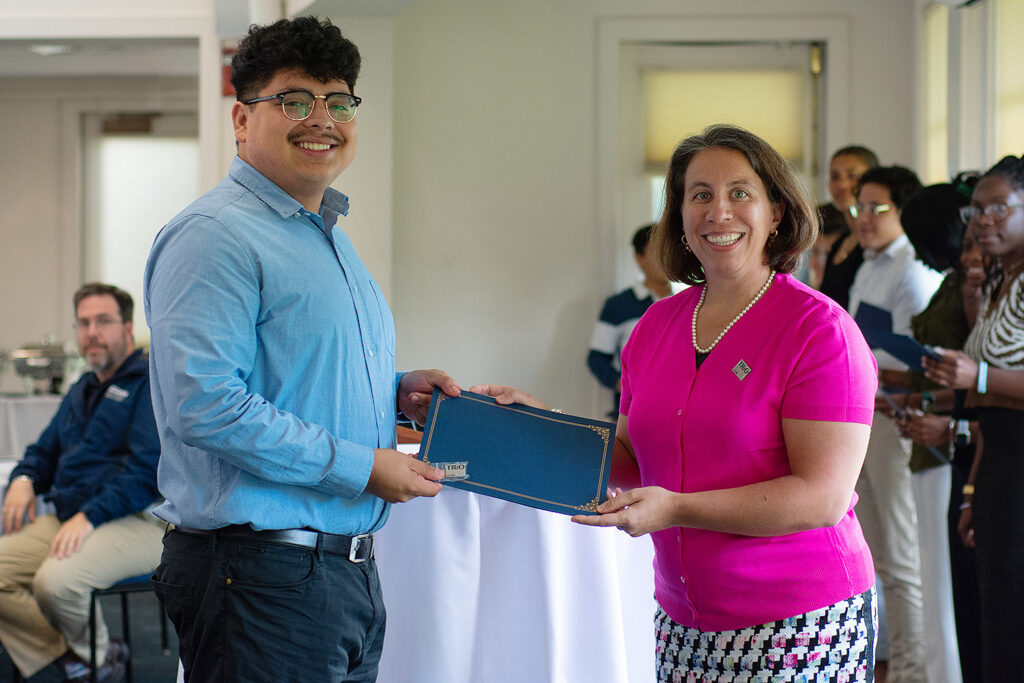
CESAR RODRIGUEZ ’24
Rodriguez’s research interests lie at the intersection of robotics, design, and control, with a “profound passion” for bringing autonomous machines to life. He’s working with Associate Professor of Electrical and Computer Engineering Ashwin Dani at the Robotics and Controls Lab. “I am fascinated by the entire lifecycle of robots, from conceiving their design to harnessing their capabilities through intelligent control systems,” he said.
Rodriguez, a first-gen student from New Bedford, Mass. credits several educators for affecting his life in a positive way and spurring his interest in engineering. He plans to attend graduate school and earn a Ph.D. in electrical engineering.
“Someday I want to become a professor, and if it wasn’t for the McNair program, I would have never thought this was achievable,” he said.
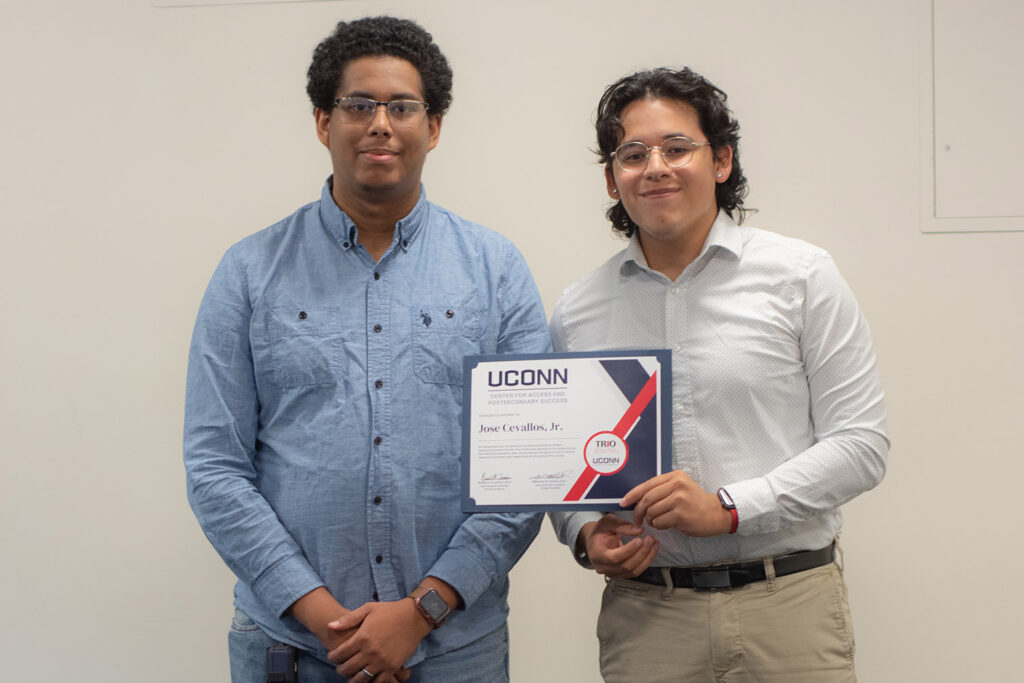
JOSE CEVALLOS JR. ’24
Cevallos, a first-gen student born in Ecuador, grew up Stamford and currently lives in Norwalk. He’s working with Daniel Anglés-Alcázar, assistant professor of physics and graduate student Jonathan Mercedes-Feliz on investigating black hole accretion and feedback cycles in active galaxies using cosmological hydrodynamic simulations.
“I hope to one day use my skills and knowledge to develop new products or technologies that can help advance space exploration and understand the cosmos. Post-UConn I plan to attend graduate school in a field of astronomy, astrophysics, or aeronautical engineering with help and guidance from the McNair Program.”
Ronald McNair himself held a Ph.D. in physics and was the second Black NASA astronaut to fly in space. He and six other crew members died in the Challenger shuttle explosion in 1986. Since 1989, the McNair Program, funded by the U.S. Department of Education, has awarded grants to low-income, underrepresented, and first-generation students with the goal to prepare participants for doctoral studies through involvement in research and other scholarly activities. Nationwide, there are only 206 institutions with McNair Programs.
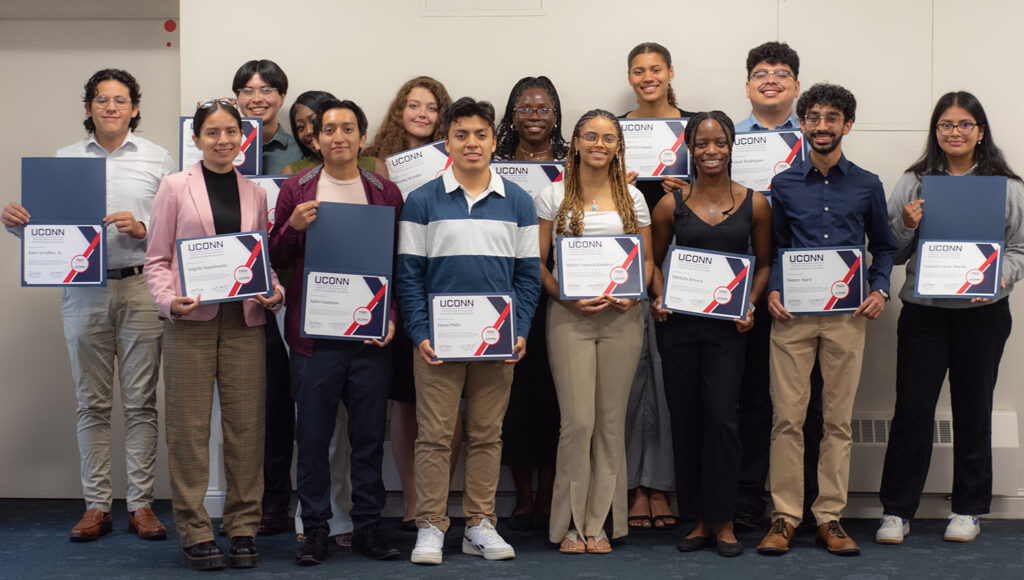
Other McNair Scholars and their areas of study in the 11th cohort include Georgiette Adejayan, allied health sciences; Michela Brown, biological Sciences; Kayvona Brown, psychological sciences; Rachel Cleveland, physics; Maria Cruceta Ramirez, pharmaceutical studies; Julio Guaman, molecular and cell biology; Angela Saquinaula, finance; Brooke Kvedar, molecular and cell biology; Lisbeth Lucas-Moran, allied health sciences; and Nathan Velazquez, pathobiology.
Currently, several engineering major McNair Scholars are in Ph.D. programs at UConn, the University of Texas at Austin, Boston University, Northwestern University, and the University of California, Berkley.
“I have the good fortune of remaining connected with the students as alumni for a decade after earning their bachelor’s degrees, for our federal, annual report, but moreover to continue to guide in the actual transition to and through graduate study,” Trueman said. “It is a pleasure to get to know the scholars and their talent so well to be able to have deep conversation to help them establish career pathways in which they will feel fulfilled.”
